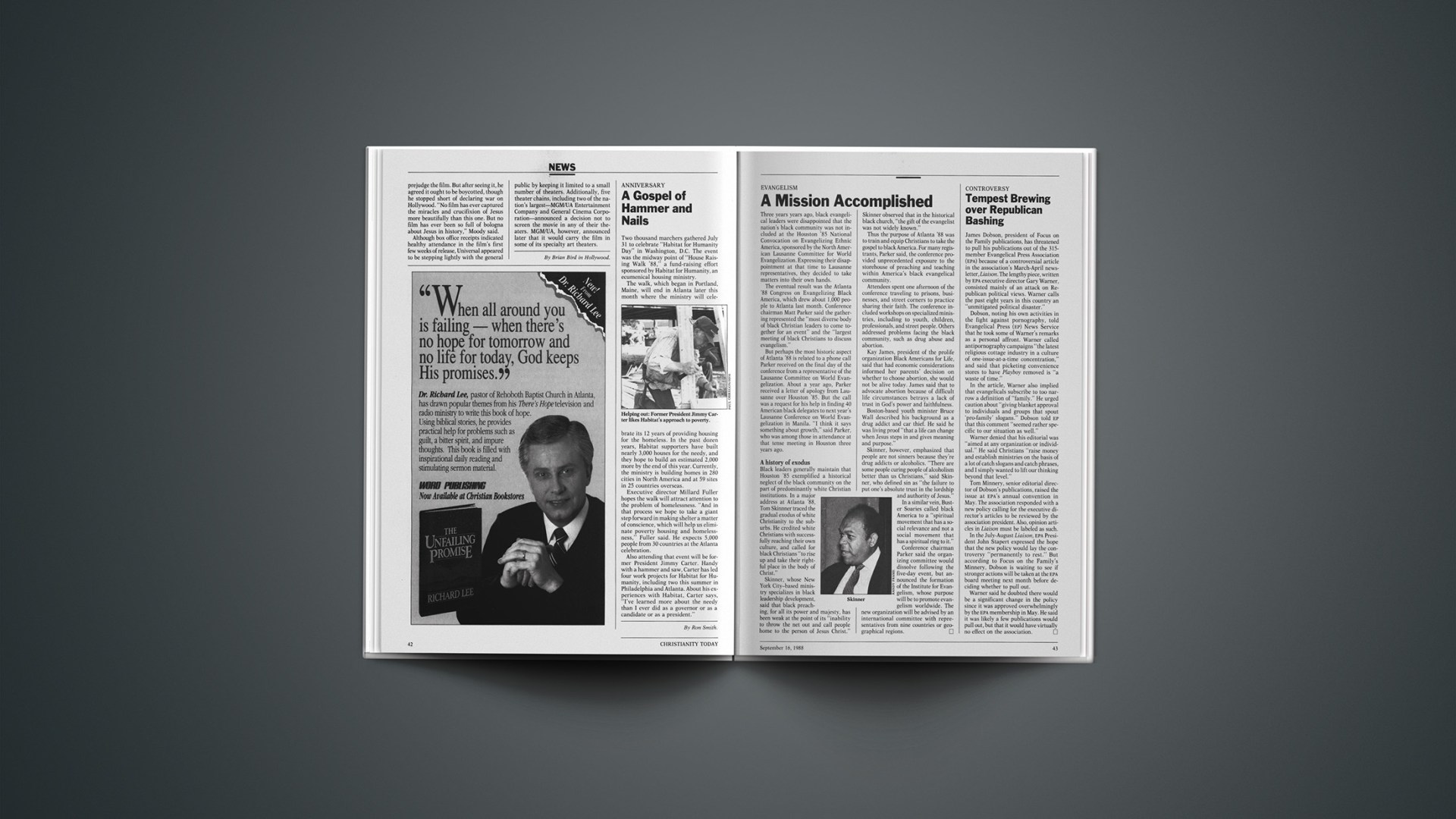EVANGELISM
Three years years ago, black evangelical leaders were disappointed that the nation’s black community was not included at the Houston ‘85 National Convocation on Evangelizing Ethnic America, sponsored by the North American Lausanne Committee for World Evangelization. Expressing their disappointment at that time to Lausanne representatives, they decided to take matters into their own hands.
The eventual result was the Atlanta ‘88 Congress on Evangelizing Black America, which drew about 1,000 people to Atlanta last month. Conference chairman Matt Parker said the gathering represented the “most diverse body of black Christian leaders to come together for an event” and the “largest meeting of black Christians to discuss evangelism.”
But perhaps the most historic aspect of Atlanta ‘88 is related to a phone call Parker received on the final day of the conference from a representative of the Lausanne Committee on World Evangelization. About a year ago, Parker received a letter of apology from Lausanne over Houston ‘85. But the call was a request for his help in finding 40 American black delegates to next year’s Lausanne Conference on World Evangelization in Manila. “I think it says something about growth,” said Parker, who was among those in attendance at that tense meeting in Houston three years ago.
A History Of Exodus
Black leaders generally maintain that Houston ‘85 exemplified a historical neglect of the black community on the part of predominantly white Christian institutions. In a major address at Atlanta ‘88, Tom Skinnner traced the gradual exodus of white Christianity to the suburbs. He credited white Christians with successfully reaching their own culture, and called for black Christians “to rise up and take their rightful place in the body of Christ.”
Skinner, whose New York City-based ministry specializes in black leadership development, said that black preaching, for all its power and majesty, has been weak at the point of its “inability to throw the net out and call people home to the person of Jesus Christ.” Skinner observed that in the historical black church, “the gift of the evangelist was not widely known.”
Thus the purpose of Atlanta ‘88 was to train and equip Christians to take the gospel to black America. For many registrants, Parker said, the conference provided unprecedented exposure to the storehouse of preaching and teaching within America’s black evangelical community.
Attendees spent one afternoon of the conference traveling to prisons, businesses, and street corners to practice sharing their faith. The conference included workshops on specialized ministries, including to youth, children, professionals, and street people. Others addressed problems facing the black community, such as drug abuse and abortion.
Kay James, president of the prolife organization Black Americans for Life, said that had economic considerations informed her parents’ decision on whether to choose abortion, she would not be alive today. James said that to advocate abortion because of difficult life circumstances betrays a lack of trust in God’s power and faithfulness.
Boston-based youth minister Bruce Wall described his background as a drug addict and car thief. He said he was living proof “that a life can change when Jesus steps in and gives meaning and purpose.”
Skinner, however, emphasized that people are not sinners because they’re drug addicts or alcoholics. “There are some people curing people of alcoholism better than us Christians,” said Skinner, who defined sin as “the failure to put one’s absolute trust in the lordship and authority of Jesus.”
In a similar vein, Buster Soaries called black America to a “spiritual movement that has a social relevance and not a social movement that has a spiritual ring to it.”
Conference chairman Parker said the organizing committee would dissolve following the five-day event, but announced the formation of the Institute for Evangelism, whose purpose will be to promote evangelism worldwide. The new organization will be advised by an international committee with representatives from nine countries or geographical regions.










